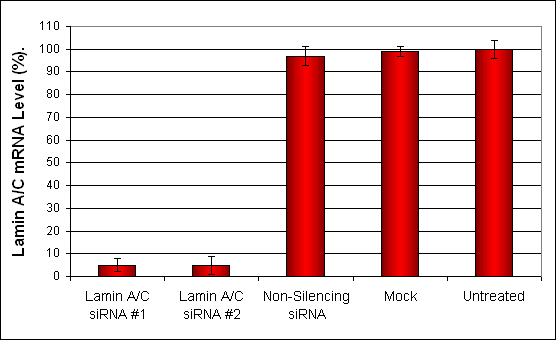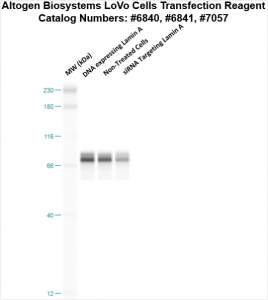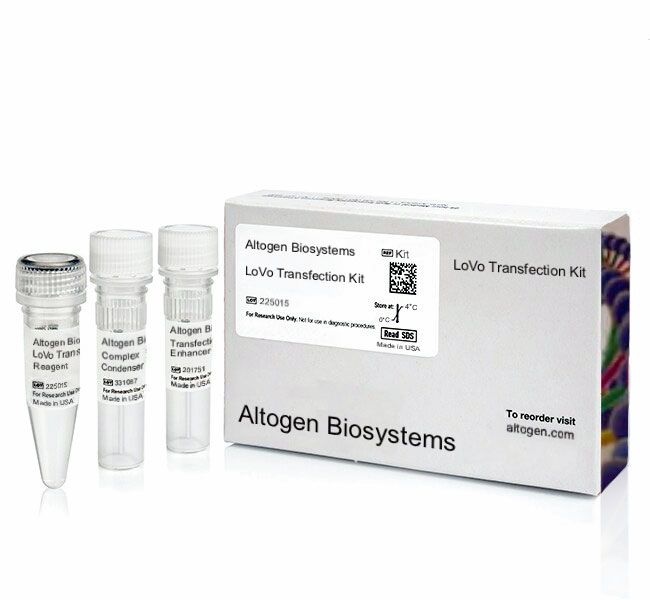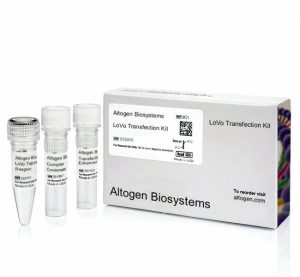Description
Purchase Orders: Click “Add to Cart” button to order, then email PO to orders@altogen.com.
Product Availability: In Stock.
Transfection Reagent for LoVo Cells (Colon Adenocarcinoma Cells, CCL-229)
-
Two component formulation enhances lipid mediated transfection efficiency
-
Optimized easy-to-use transfection protocol provided for transfection of siRNA, DNA, mRNA, and microRNA
-
Reproducible transfection results
-
Works well for standard reverse transfection and high-throughput applications
-
Download in vitro LoVo transfection protocol: [PDF]
- Download LoVo CRISPR/Cas9 transfection protocol: [PDF]
-
Download PowerPoint presentation for LoVo cells transfection kit: [PPT]
- UPC/GTIN/EAN: 860002089787
-
Brand: ALTOGEN®, developed and manufactured by Altogen Biosystems
Transfection Efficiency:
Reagent exhibits at least 94% transfection efficiency of siRNA delivery. Transfection efficiency was determined by qRT-PCR.
Product Description:
Optimized transfection kit for high transfection efficiency of LoVo cells, a human colon cancer cell line. Used in molecular biology to facilitate the introduction of foreign nucleic acids (DNA and RNA) into LoVo cells. Compatible with DNA and RNA transfection.
Transfection Protocol and SDS:
Download Altogen Biosystems LoVo Transfection Protocol: [PDF]
Download SDS: [PDF]
LoVo Cell Line:
Colorectal cancer is the third most commonly detected cancer in the United States, reportedly accounting for nearly 50,000 fatalities annually, as per the American Cancer Society (ACS). The LoVo epithelial cell line was isolated in 1971 from a metastatic tumor of a 56-year-old Caucasian male with colorectal adenocarcinoma. LoVo cells express multiple oncogenes, including N-ras, H-ras, Myb, c-myc, K-ras, sis and fos genes. Also, CC-3 and CC-4 tumor-specific nuclear matrix proteins are expressed. However, the cells are negative for expression of colon antigen 3 and CSAp (CSAp-). The LoVo cell line presents an aneuploid karyotype with a modal number of 49 and a doubling time of approximately 37 hours. A broad range of LoVo cells shows an extra B chromosome as well as altered A2. The LoVo cell line is a suitable host for studying various types of colon cancer. Altogen Biosystems provides highly efficient transfection reagent kits for the LoVo cell line.
LOVO cells are a type of human colon cancer cell line that was originally derived from a primary tumor in a patient with colorectal adenocarcinoma. These cells have been widely used as a model system for studying various aspects of colorectal cancer biology, including the molecular mechanisms underlying tumor development and progression, and the identification of potential therapeutic targets for the treatment of colorectal cancer. LOVO cells have several properties that make them useful for research. Firstly, they are relatively easy to culture in the laboratory and can be grown in large quantities. Secondly, they express markers of colorectal cancer, such as carcinoembryonic antigen (CEA) and mucin-1 (MUC-1), and exhibit several features characteristic of colorectal cancer, including uncontrolled proliferation, invasion, and metastasis. Thirdly, they respond to various stimuli, such as growth factors and cytokines, making them a useful model system for studying the effects of these factors on colorectal cancer cell growth and survival. Research using LOVO cells has contributed significantly to our understanding of colorectal cancer biology. For example, LOVO cells have been used to study the role of various signaling pathways, such as the Wnt/β-catenin and PI3K/Akt/mTOR pathways, in the development and progression of colorectal cancer. Additionally, LOVO cells have been used to screen for potential anticancer agents, including chemotherapy drugs and targeted therapies. Furthermore, LOVO cells have been used to study the mechanisms underlying drug resistance in colorectal cancer. Studies have shown that resistance to chemotherapy drugs such as 5-fluorouracil (5-FU) and oxaliplatin can arise due to alterations in drug metabolism, DNA damage repair mechanisms, and drug efflux pumps. Understanding the mechanisms of drug resistance in LOVO cells has led to the development of combination therapies and targeted therapies that can overcome drug resistance in colorectal cancer.
Mutations:
| KRAS | 3845 | 37 | 12 | 25398281 | 25398281 | Missense_Mutation | SNP | C | T |
| FBXW7 | 55294 | 37 | 4 | 153247289 | 153247289 | Missense_Mutation | SNP | G | A |
| GRM7 | 2917 | 37 | 3 | 7620310 | 7620310 | Nonsense_Mutation | SNP | C | T |
| PIK3CB | 5291 | 37 | 3 | 138374293 | 138374293 | Missense_Mutation | SNP | C | T |
| DCDC1 | 341019 | 37 | 11 | 30953328 | 30953328 | De_novo_Start_OutOfFrame | SNP | G | A |
| TRPV3 | 162514 | 37 | 17 | 3431412 | 3431412 | Silent | SNP | C | T |
| KIAA1644 | 85352 | 37 | 22 | 44681447 | 44681447 | Missense_Mutation | SNP | G | A |
| DTX3L | 151636 | 37 | 3 | 122284753 | 122284753 | Missense_Mutation | SNP | G | A |
| LIX1 | 167410 | 37 | 5 | 96430694 | 96430694 | Missense_Mutation | SNP | G | A |
| ANKHD1 | 54882 | 37 | 5 | 139886500 | 139886500 | Silent | SNP | G | A |
| SLC17A2 | 10246 | 37 | 6 | 25921500 | 25921500 | Silent | SNP | C | A |
| HIST1H4G | 8369 | 37 | 6 | 26247163 | 26247163 | Missense_Mutation | SNP | C | T |
| CHRNA2 | 1135 | 37 | 8 | 27320707 | 27320707 | Missense_Mutation | SNP | T | A |
Data:

Figure 1. siRNAs targeting Lamin A/C mRNA or non-silencing control siRNA were transfected into LoVo cells following the recommended protocol. At 48 hours post-transfection the cells were analyzed by qRT-PCR for Lamin A/C gene expression levels. 18S rRNA levels were used to normalize the Lamin A/C data. Values are normalized to untreated sample. Data are means ± SD (n=4).

Figure 2. Protein expression of Lamin A in LoVo cells. DNA plasmid expressing Lamin A or siRNA targeting Lamin A were transfected into LoVo cells following Altogen Biosystems transfection protocol. At 72 hours post-transfection the cells were analyzed by Western Blot for protein expression levels (normalized by total protein, 10 µg of total protein loaded per each well). Untreated cells used as a negative control.
Selected LoVo transfection reagent citations:
- Carcinogenesis. 2014. A mechanistic study of the proapoptotic effect of tolfenamic acid … Jeong et al [PDF]
- Diabetologia. 2012 55(7):2069-79. The p47phox- and NADPH oxidase organiser 1 … Youn et al [PDF]
Altogen Biosystems transfection and electroporation products for life sciences and cancer research. Company developed two types of in vivo delivery kits for animal research: Tissue-targeted reagents (delivery to liver, pancreas, and kidney tissues), and broad range in vivo delivery reagents (PEG-Liposome, Nanoparticle-based, Lipid-based, and Polymer-based kits). Advanced formulation of reagents and optimized transfection protocols provide efficient intracellular delivery of proteins, DNA, mRNA, shRNA, siRNA, and other negatively charged molecules in vitro and in vivo. Read more about transfection technology at Altogen’s Transfection Resource. Altogen Labs provides GLP-compliant contract research studies for pre-clinical research, IND applications, and drug development. Biology CRO services include: Xenograft models (90+), development of stable cell lines, ELISA assay development, cell-based and tissue targeted RNAi studies, safety pharm/tox assays, and other studies (visit AltogenLabs.com).
Volume Options:
- 0.5 ml (Catalog #6840)
- 1.5 ml (Catalog #6841)
- 1.5 ml CRISPR (Catalog #2167)
- 8.0 ml (Catalog #7057)
Purchase Orders: Click “Add to Cart” button to order, then email PO to orders@altogen.com.
Product Availability: In Stock.






